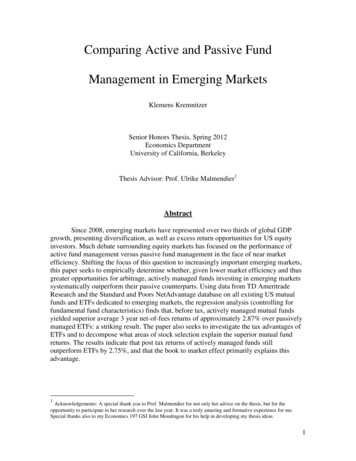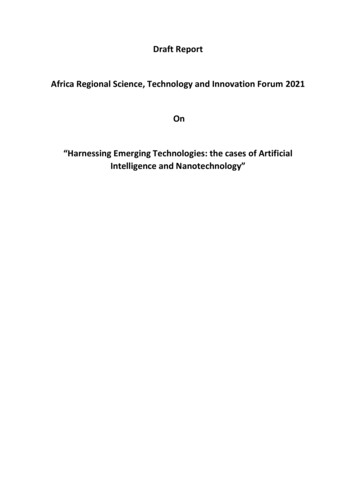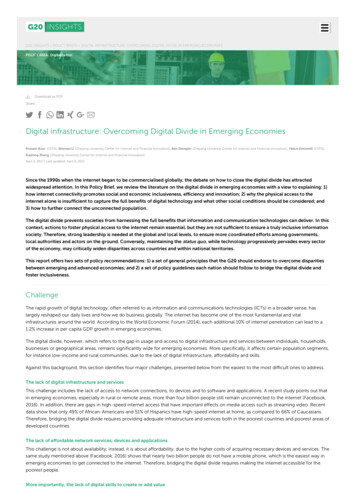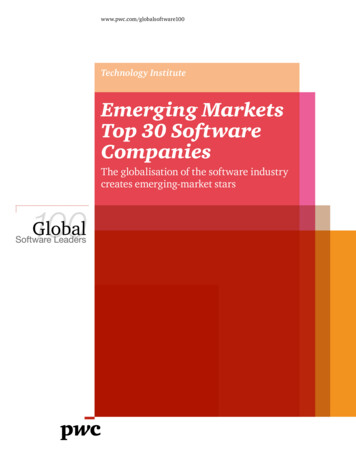
Transcription
ManitouQuarterly CommentaryJune 30, 2018Investment Management Ltd.“Fear, greed, and hope have destroyed more portfolio value than any recession or depression wehave been through.”“By relying on the statistical information rather than a gut feeling, you allow the data to lead youto be in the right place at the right time. To remain as emotionally free from the hurly burley ofthe here and now is one of the only ways to succeed.”We owe these words of wisdom to James O’Shaunghessy of O’Shaunghessy Capital. They seemed particularlyapt, given there is no shortage of concerns generated by the 24/7 news cycle - stalled NAFTA negotiations, fear ofBrexit, populism everywhere, no deals by the “deal maker”, and a ratcheting back of monetary policy in the UnitedStates. North American equity markets have been somewhat impervious to these concerns and have stabilized athigher levels, supported by strong forward looking earnings growth and massive corporate share buy-backs. TheGlobal Purchasing Managers Index, which is a leading economic indicator, shows a small improvement inmanufacturing sentiment. This generally translates into an acceleration of GDP, employment and wage growth,and foretells healthy corporate earnings. This happy scenario is currently most evident in the US, but determininghow sustainable and far reaching it will span is unknowable.As the rhetoric from Washington has become more aggressive, concerns about an all out “trade war” quite naturallyhave increased. While the spotlight constantly focuses on Mr. Trump, Premier Xi, by way of immediate retaliatorytariffs, is demonstrating the power of China on the world stage in what is a “no win” game. Tariffs beget tariffs,adding to end market prices and most importantly disrupt international supply chains that have been decades in themaking. Analysts are proffering estimates of the damage to the North American economy that could result.Macro-economic Outlook57Returning to the broad economic fundamentals,Chart 1 on the right highlights the GlobalPurchasing Managers Indices. As depicted,sentiment for manufactured goods remainsstrongest in the developed markets. This issomewhat dampened by geo-politicaldevelopments in Germany, Italy and uncertaintyregarding Brexit.5655Global PMI'sWith Developed (DM) and Emerging (EM) Market 50.95150During the late stages of a market cycle it is4949customary that investors exhibit nervousnessabout the magnitude and pace of . This nervousness manifests itself inChart 1Courtesy of TD Securities - June 2018the form of increased volatility, becausepremature or over zealous rate increases can lead to recessions or significant economic slowdowns. In hisremarks thus far, Fed Chairman Jay Powell has hewed to existing policy, with only a gradual unwinding of the Fed’sbalance sheet. To some extent this modest tightening has been offset by large cash inflows that have driven up thevalue of the US dollar. The yield curve has flattened modestly, but an inversion, whereby short rates exceed yieldsof long rates has yet to occur. Historically, an inverted yield curve is a precursor of a recession. While ‘this time isdifferent’ are the four most dangerous words on Wall Street, the healthy business climate and economicM740JUN 20181
ManitouQuarterly CommentaryJune 30, 2018Investment Management Ltd.fundamentals suggest that an all out recession is not imminent. The more important economic variable is therelationship between interest rates and shareholder’s return, expressed by the market’s overall price to earningsyield. Chart 2 below indicates a healthy risk premium accruing to equity owners. In our view a further normalizationof short term rates would not be a major negative for two primary reasons: long rates and the market’s currentvaluation level are not excessive based on long-term historical averages.Over the first two quarters of 2018 there has beena wide disparity within the broad market averages.The tech sector has out-performed strongly enoughto get the overall S&P 500 into positive territory.Algorithm driven trading has contributed to volatilityespecially on days of Twitter delivered tradepolicies.16S&P 500 Forward Earnings Yield (And 10 Year Treasury Bond Yield ())1614141212101088To demonstrate this disparity 10 stocks including66Amazon, Microsoft, Apple, Netflix, Facebook,44Google, MasterCard, Visa, Adobe Systems andNvidia, representing 16% of the cap weighted S&P22500 Index, attributed 122% of the Index’s year-to00date return. These are all growth stocks to be sure,19801985199019952000200520102015but what of valuation? Our Manitou mandates holdChart 2Courtesy of TD Securities - June2018Apple, Microsoft, Google and MasterCard, whichcollectively finished the quarter trading at 24 times 2018 estimated earnings, while the other six stocks in thisheavyweight group finished the quarter trading at an average slightly above 60 times earnings. For furtheremphasis, the top 25 companies in the S&P 500 by capitalization outweighed the bottom 350 stocks.6.232.82M726JUL 2018Notwithstanding the above economic commentary, we align with Peter Lynch, the legendary manager of the FidelityMagellan Fund, who believed that 12 minutes a year spent on economics was generally 10 minutes too much. Thisview was driven by his experience that well managed businesses, and by extension their intrinsic values, weredriven by their ability to generate profits over time.The meaning of management is “the process of dealing with or controlling things or people”. The two mostimportant variables within our control are the quality of the businesses in which we are prepared to invest and theprices we are prepared to pay. Similarly, those managing the businesses held within our mandates control theirown decision making. They determine what levels of debt, if any, they are prepared to carry; what jurisdictions inwhich they wish to operate or invest; what their pricing policies will be, etc. Savvy management teams strive toanticipate or at least be prepared for unexpected occurrences. Through our research we are growing increasinglycomfortable with the immediate and longer term prospects of the businesses we currently own. We are also addingmany great businesses to our expanding library of highly desirable investments. Thus we anticipate being able togenerate favourable returns should markets continue to grind higher. We will also protect capital and furtherupgrade several holdings when prices regress from valuations that are statistically high. Knowing when that willeventually happen is unknowable, but when it does we will be prepared.2
ManitouInvestment Management Ltd.Quarterly CommentaryJune 30, 2018Manitou MandatesFor Q2 2018, results varied by mandate relative to their respective benchmarks. Although our strategy is toachieve an absolute return of CPI 7.0% on a three year rolling average, we do monitor our results versus theappropriate benchmark as well. Generally speaking, global markets continued their upward climb. Mandateperformance was materially impacted by the US technology sector with outperformance largely due to stockselection. Manitou Global Equity Composite returned 5.58% vs. MSCI and S&P Composite of 3.26%, ManitouEquity (North America) Composite 5.89% vs. TSX/S&P Composite of 6.16%, Canadian Equity Composite 5.94% vs. TSX Index of 6.77%, US Equity Composite 5.59% vs. S&P 500 5.53%, Focus 5 3.65% vs.S&P/TSX Composite 6.16%, International Equity Composite 0.62% vs. iShares MSCI World Index ETF of 0.99%, Manitou Income Fund 0.80% vs. Canadian Universal Bond Index of 0.35% and Total Return Yield(TRY) 1.96% vs. CPI 7 2.22%.The principal contributors to this quarter’s returns in Manitou Global Equity were Apache ( 24.71%), Shopify Inc.( 19.58%), Canadian Natural Resources (CNQ) ( 17.72%), Constellation Software Inc. ( 16.78%), andMasterCard Incorporated ( 14.72%).Apache and CNQ benefited from the increase in global oil prices over the quarter. These in turn reflect politicalposturing from all producing countries, which result in supply and demand imbalances. In particular, thedeterioration of relations between the US and Iran influenced the sector as a whole and led to higher prices. As ofquarter end, oil prices had reached levels not seen since 2014.Shopify’s stock price increased over the quarter as did the technology sector as a whole. This business continuesto generate sales comfortably above expectations, which reflects its best-in-class ecommerce platform.Constellation Software increased on non-firm specific news. It continues to deliver on its strategy.Finally, MasterCard’s share price increase reflected continued strong results due to positive momentum in theglobal economy.Detractors for the quarter included Walgreen’s (-5.64%), Dentsply-Sirona (-10.69%), Berkshire Hathaway (-4.36%)and Johnson & Johnson (-2.92%).Walgreen’s had appreciated nicely due to its inclusion in the Dow Jones Industrial Index, but declined on news thatAmazon entered the prescription delivery market with the acquisition of Pillpack.Dentsply-Sirona fell with the announcement post Q1 results. New management stated that it would be investingheavily in sales and integration in the short term, leading to downward revisions in profitability until 2019.Berkshire Hathaway declined on no firm specific news.Johnson & Johnson’s share price came under pressure, as did most health care related stocks during the quarter.Manitou Equity (North America) results were very similar to the Global Equity Fund. Along with Apache( 24.65%), CNQ ( 18.10%), Constellation Software ( 16.66%), and MasterCard ( 14.72%).Detractors included Dentsply-Sirona (-11.00%), Walgreen’s (-5.90%), 3M (-7.98%) and IBM (-6.15%).3
ManitouInvestment Management Ltd.Quarterly CommentaryJune 30, 20183M declined on no firm specific news.IBM’s share price declined as a result of its lower growth profile within the US technology sector.Canadian Equity contributors included Suncor ( 20.94%), Shopify ( 19.63%), CNQ ( 17.84%), ConstellationSoftware ( 16.83%) and TMX Group ( 15.80%). All with the exception of TMX have been discussed above.TMX’s share price rose on improving real time data subscriptions, the announcement of extended derivative tradinghours and a 16% dividend increase.Detractors included Total Energy Services (-15.09%), Prairie Sky Royalty (-7.28%), Bank of Nova Scotia (-4.48%)and Ensign Energy Service (-1.27%).The Bank of Nova Scotia declined on negative Canadian housing data.There was no firm specific news on all other companies.US Equity positive contributors were Apache ( 24.76%), Shopify ( 18.53%), Apple ( 15.61%) and Microsoft at( 15.53%).Apple and Microsoft increased along with the technology sector as a whole and all other companies have beenmentioned previously.Detractors included Illinois Tool Works (-9.31%), Dentsply-Sirona (-9.11%), IBM (-5.99%), Berkshire Hathaway(-4.60%) and Johnson & Johnson (-2.59%).Illinois Tool Works declined along with all other US industrials during the quarter. The other companies have beenmentioned previously.Focus 5 top performers included Apache ( 24.86%), Constellation Software ( 16.79%), Enghouse Systems( 12.95%) and Tucows ( 11.37%).Enghouse increased due to the release of Q1 results. The company has strengthened its balance sheet andincreased its cash position, putting it in the position to participate in a favourable acquisition environment for itsindustry.Tucows increased on no firm specific news.Detractors included Dentsply Sirona (-5.73%), Walgreen’s (-5.45%) and Whirlpool (-1.53%).Whirlpool declined as a result of steel tariffs implemented by the US.All other detractors have been discussed.International Equity top performers included Spirax-Sarco Engineering ( 9.81%), Anheuser-Busch Inbev( 9.25%) and Diageo ( 8.18%).Spirax-Sarco Engineering increased on no firm specific news although the stock tends to move in tandem with thegeneral global macro outlook.4
ManitouInvestment Management Ltd.Quarterly CommentaryJune 30, 2018Anheuser-Busch and Diageo both increased as a result of global alcohol market growth.Detractors included Jardine Strategic (-2.80%) and Vopak (-1.75%).No firm specific news was responsible for either companies’ share price movement.Manitou Income Fund outperformed the index by utilizing its basket clause that allows up to 10% exposure tounrated or less than investment grade securities. These included Constellation Debentures (that are now rated)and Easy Legal Financial debentures. We are comfortable with both of these credits, which contributed nicely toour outperformance over the quarter.TRY – Our newly launched Total Return Yield Fund (TRY) achieved a satisfactory total return of 1.96% for thequarter.CurrencyThe strengthening of the US dollar versus the Canadian dollar lead to a positive contribution to our mandates overthe quarter.Company HighlightsNovartisThe only notable addition over the quarter was Novartis which was added to the International Equity Fund.Novartis is a Swiss-based global healthcare company and one of the world’s leading producers of innovativepharmaceuticals. The company develops healthcare solutions for a number of therapeutic areas but is particularlystrong in oncology, immunology, and ophthalmology.Novartis’ diversified portfolio of pharmaceuticals provides a steady revenue base and excellent cash flowgeneration. At the same time, the company is involved with the development of a number of leading-edgepharmaceutical solutions that offer promising growth opportunities.Novartis is also one of the world’s largest generic drug manufacturers and a leading player in the rapidly growingfield of biosimilars.Novartis was purchased as a high quality long-term investment at a reasonable valuation.Walgreen’s Boots Alliance (WBA)In light of the disruption caused by Amazon and its continued foray into the US retail sector we felt it appropriate toreview our investment thesis on Walgreen’s and why we continue to hold the stock across mandates.Amazon first entered the US bricks and mortar retail space in 2017 with the acquisition of Whole Foods. This wasviewed by many, including us, as a sensible augmentation to Amazon’s on-line distribution network. This wasfollowed in June 2018 by the 1 billion purchase of Pillpack, an online prescription delivery company, whichimportantly gives Amazon the necessary licensing it needed to actively pursue mail and drug distribution throughoutthe US.5
ManitouInvestment Management Ltd.Quarterly CommentaryJune 30, 2018It is well documented that the US healthcare industry is undergoing a period of disruption, which is intended tolower drug costs for all Americans. Amazon’s entry into this market merely exacerbates this disruption. It is ourview that the market can support more than one player, and Walgreen's is well positioned to respond to thedisruption and competition confronting the industry. Walgreen’s will continue to execute its strategy formulatedover the last 35 years, which has successfully consolidated drug retailing and distribution globally in order to boostpurchasing power and offset long-term healthcare cost pressures.Walgreen’s aim is to build an open and preferred network by forging strategic partnerships and alliances withwholesalers and PBMs (pharmacy benefit managers) as opposed to making outright vertical purchases, be it withinsurers, distributors and/or other healthcare and service providers.Walgreen’s is able to expand various health-related services via partnerships with such companies as LabCorp andFedEx to address home delivery demand. Furthermore, the company has scaled in physical store count to achievesignificant purchasing power in wholesale.There is no doubt that prescription home delivery demand will continue to grow. However, having direct access toa pharmacist remains a necessity in most cases. In fact, according to the Wall Street Journal (weekend ed., July 1,2018), the percentage of pharmacy consumers accessing a bricks and mortar store has grown from 82% to 85%over the last year.We continue to believe in the quality of the Walgreen’s franchise, the merit of its global consolidation strategy, itsbusiness longevity and management’s ability to adapt to industry changes. Like Amazon, Walgreen’s is led by avisionary leader. Executive Chairman and major shareholder, Stefano Pessina, has been at the forefront ofglobally expanding the drug retailing and distribution industry for several decades. Both Amazon and Walgreen’sare pursuing an omni-channel strategy, but from different positions. Amazon’s foray into the drug delivery businesswill materially impact the industry dynamics of the drug retail and broader healthcare industries. However, basedon the valuation currently applied to its stock price, we believe the market is overlooking the virtues of Walgreen’somni-channel strategy and the ability of its proven management team to successfully execute on that strategy.Conclusions1. It is essential to filter out geo-political noise when evaluating the equity markets. Business is good, earnings areon an upward trajectory, and many investment grade companies are trading at average earnings multiples.2. Administered interest rates are increasing and will eventually affect corporate borrowing costs and temper priceearnings ratios. Long dated maturities will decline in value, thus it is important to maintain a short duration infixed income portfolios.3. Disruption is rife in many industries today. As illustrated in our analysis of Walgreen’s, it important to owncompanies with strong balance sheets, and experienced management groups that are shareholder friendly andcapable of allocating capital in changing circumstances.4. Our research will continue to seek out value in both North American and international markets, in companiesthat have a sustainable competitive advantage and meet our stringent financial criteria.77 King Street West, Suite 3710, TD North Tower, Toronto Dominion Centre, Toronto, Ontario M5K 1K7 T.416.865.1867 www.manitouinvestment.com6
Software ( 16.83%) and TMX Group ( 15.80%). All with the exception of TMX have been discussed above. TMX's share price rose on improving real time data subscriptions, the announcement of extended derivative trading hours and a 16% dividend increase.











